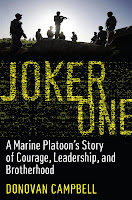
Here is a quick summary of two books on
Joker One: A Marine Platoon’s Story of Courage, Leadership, and Brotherhood (Donovan Campbell).
The Assassins' Gate:

Here is a quick summary of two books on
Joker One: A Marine Platoon’s Story of Courage, Leadership, and Brotherhood (Donovan Campbell).
The Assassins' Gate:
Two biographies for your consideration: if you can only read one, read Churchill.
Nixon, vol. I. (Stephen Ambrose). Ambrose is well-known for his military dramas of WWII (Band of Brothers, etc), but he also wrote biographies of Dwight Eisenhower and Richard Nixon. Nixon is possibly the most vilified president of modern times, a man who normalized relations with
Churchill, (Martin Gilbert). Gilbert is the official biographer of Winston Churchill, and, together with Randolph Churchill, has written a massive multi-volume work of W.S.C. The nice thing about Churchill is that it is a one-volume distillation (tho it still runs close to 1,000 pages) of Gilbert’s larger work. Here you get the essential outline of Churchill’s life, and what a life. Paul Johnson has written a much-lauded new biography of Churchill that runs much swifter 200 or so pages, so Johnson’s work might be the place to start. But I can’t believe Churchill could be described in so little space, since even Gilbert is often forced to cut things down to a bare minimum for his volume. To borrow Tom Wolfe’s phrase, Churchill was indeed a man in full.